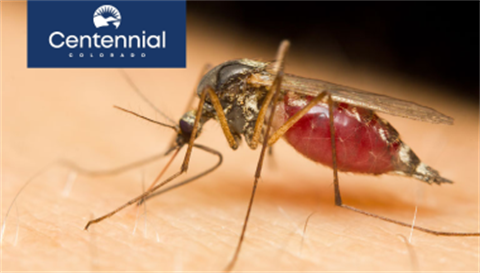West Nile Virus Identified in Arapahoe County
Published on September 06, 2024

Mosquitoes in Arapahoe County have tested positive for West Nile virus. Although no cases have been reported in Centennial, the City urges residents to take precautions to prevent mosquito bites in all outdoor areas.
The City works with a third-party organization to monitor mosquito activity. They inspect larval sites and operate four surveillance trap sites, using CDC Light Traps to track the species and number of adult mosquitoes. These traps are collected weekly for analysis.
Prevention Tips
Despite the presence of West Nile virus, prevention efforts are proving effective. To reduce your risk:
- Use EPA-Approved Insect Repellent: Repellents containing DEET are safe and effective for individuals 2 months and older, including pregnant and breastfeeding women. Learn more about choosing and applying insect repellent for children.
- Avoid Peak Mosquito Hours: Stay indoors at dawn and dusk when mosquitoes are most active.
- Stay Away from Standing Water: Avoid recreational activities near lakes and ponds. If camping, use mosquito netting.
- Wear Protective Clothing: Long sleeves and pants can help protect against mosquito bites.
- Eliminate Standing Water: Drain sources such as puddles, gutters, flowerpots, tires, pool covers, boats, and tarps.
- Keep Mosquitoes Out: Use air conditioning or fans instead of opening windows. Ensure screens on windows and doors are intact.
- Maintain Septic Systems: Ensure your septic tank is in good repair, and cover or seal any vents or openings.
Symptoms and Risks
Symptoms of West Nile virus typically appear 2-14 days after exposure. While most people do not develop symptoms, about 20% may experience:
- Fever
- Body aches
- Headache
- Occasionally, skin rashes and swollen lymph nodes
Severe symptoms are rare (less than 1%) but can affect the nervous system. Those over 60 or with certain medical conditions are at higher risk. Severe symptoms include:
- High fever
- Headache
- Neck stiffness
- Muscle weakness
- Confusion or disorientation
- Paralysis
- Tremors
- Coma
Mild symptoms usually resolve on their own. For more information, visit the Colorado Department of Public Health and Environment.